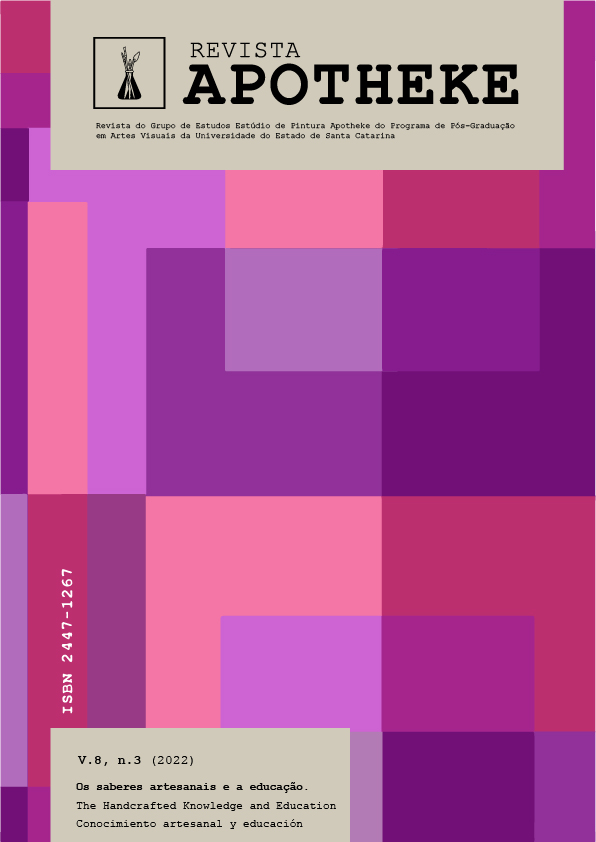Ten ways to miss the eye of a needle
DOI:
https://doi.org/10.5965/24471267832022096Keywords:
Artistic Education, textile, handycrafts, manual skillsAbstract
Under a narrative methodology of professional experiences, a first approximation is presented on the experiences lived and the attitudes observed in a textile art workshop for adolescents in a private secondary school, this workshop is considered as a space for the recovery of the proposal made by the New Educational Model proposed in Mexico by the Ministry of Public Education (SEP) in 2017 around the so-called Areas of Curricular Autonomy that as of 2019 came into disuse. The active observation of the phenomena that occurred in this new workshop encourages reflection on the relationship between the development of manual skills, cognitive processes and the development of socio-emotional skills that arise while adolescents face aesthetic experiences in spaces of trust and cooperation by medium of textile materials and tools.
Downloads
References
ACASO, María. La educación artística no son manualidades, nuevas prácticas en la enseñanza de las artes y la cultura visual. Madrid: Catarata, 2009
BUENO I TORRENS, David. Neurociencia para educadores. Barcelona: Octaedro, 2017
DEWEY, John. El arte como Experiencia. Barcelona: Paidós Estética, 2018
GREENE, Maxine. Liberar la imaginación. Barcelona: Graó.2005
GREENE, Maxine.Notras sobre educación artística. En Autor. Variaciones sobre una guitarra azul. Conferencias de educación estética. México: Endere, 2004. p. 15-55
ICESI Universidad. Revista Papel de colgadura. Colombia: Universidad ICESI, 2019.
INGOLD, Tim. Líneas una breve historia. Barcelona: Gedisa, 2015
MATTHEWS, John. El arte de la infancia y la adolescencia, la construcción del significado. Barcelona y Buenos Aires: Paidós Arte y Educación, 2002
MORRIS, Desmond. Niños, cómo piensan, aprenden y crecen de los 2 a los 5 años. Barcelona: Blume, 2010
MUÑOZ, Juan Manuel, GUTIÉRREZ, Pilar y SERRANO, Rocío. Los hemisferios cerebrales: dos estilos de pensar, dos modos de enseñar y aprender. España: Universidad de Córdoba (s/a).
SECRETARIA DE EDUCACIÓN PÚBLICA. 2017, Aprendizajes clave para la educación integral, Disponible en: https://www.tamaulipas.gob.mx/educacion/wp-content/uploads/sites/3/2017/07/aprendizajes_clave_para_la_educacion_integral.pdf
SECRETARÍA DE EDUCACIÓN PÚBLICA. 2017, Autonomía Curricular. Disponible en:https://www.aprendizajesclave.sep.gob.mx/descargables/AMBITOS_AUTONOMIA_CURRICULAR.pdf
Downloads
Published
How to Cite
Issue
Section
License
Copyright (c) 2022 Julieta Irene Maldonado Gurin

This work is licensed under a Creative Commons Attribution-NonCommercial 4.0 International License.
Copyright and Licensing Policy
Authors of works submitted to Revista APOTHEKE authorize their publication in both print and digital formats exclusively for academic purposes. Reproduction is permitted, provided that the source is properly cited. Authors confirm the originality, authorship, and unpublished status of their manuscripts.
Articles published by the journal are freely available and intended for academic and non-commercial use only. All copyrights are transferred to the journal. The content of signed articles reflects the views of their respective authors and not the official position of Revista Apotheke. The author(s) agree to always cite the following reference when republishing or referring to the content originally published in Revista Apotheke:
“This article was originally published by Revista Apotheke in volume (insert volume), number (insert number), year (insert year), and is available at: http://www.revistas.udesc.br/index.php/APOTHEKE/index”
It is the sole responsibility of the authors to obtain written permission for the use of any material protected by copyright law included in their articles. Revista Apotheke is not responsible for copyright infringements committed by contributors.
Authors retain copyright and grant the journal the right of first publication, with the work licensed under a Creative Commons Attribution-NonCommercial License (CC BY-NC):
-
Attribution (BY): Licensees are allowed to copy, distribute, display, perform, and create derivative works, provided that proper credit is given to the author or licensor, in the manner specified.
-
NonCommercial (NC): Licensees may use the material only for non-commercial purposes.
After publication, authors retain the rights to their work and may republish the text.



